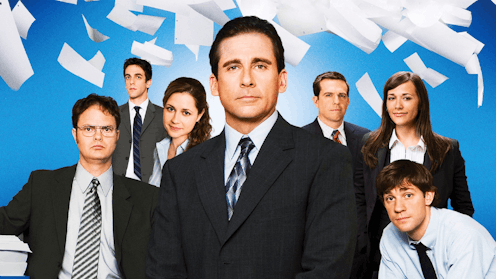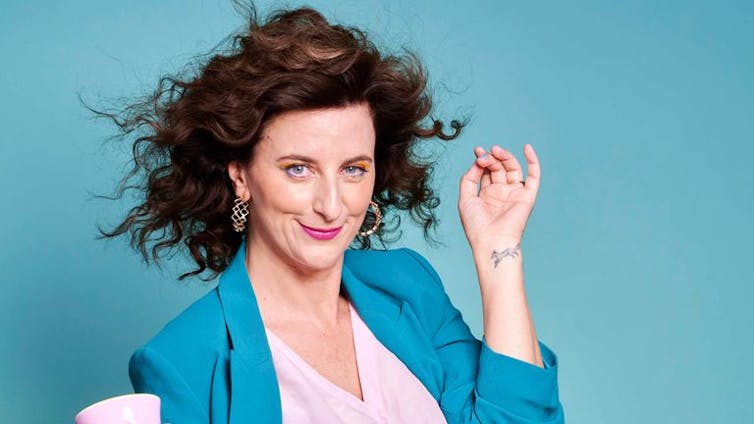Source: The Conversation (Au and NZ) – By Philippa Burne, Lecturer, BFA Screenwriting, Victorian College of the Arts, University of Melbourne, The University of Melbourne

Netflix
Twenty-two years after the original UK television series The Office was released, and 18 years after the highly successful US remake (2005-2013), Australia is getting its own version of The Office. This will be the 14th remake of the concept by Ricky Gervais, which has included adaptations in Chile, France, Finland, India, Israel, Saudi Arabia, Germany and other countries.
It’s an interesting move by Prime Video when there are already two highly rewatched English language versions available – highlighting the ongoing relevance of the workplace comedy.
It also speaks to the relative safety of remaking a known series concept rather than an original, in a time of expensive television production. Starting from an idea that has already proven hugely popular with audiences worldwide can seem to minimise the financial risk of making a new TV show – if it’s done right.

Prime
A history of remakes
There has been a long history of remakes on television. Ugly Betty (as it is known in the US version) is one of the most recognised. Originally a Colombian telenovela, Yo Soy Betty, la Fea (1999-2001), the concept has been remade in other languages around 20 times to date. Other versions include Na Daj Se, Nina (Croatia, 2007-2008) and Lotte (The Netherlands, 2006-2007), both of which I worked on adapting from the Colombian original.
Australian television concepts from the 1970s and 1980s travelled remarkably well. Sons and Daughters has versions in Germany (Verboten Liebe, 1995-2015) and Croatia, (Zabranjena Ljubav, 2004-2008). The Australian classic Prisoner became the highly popular Hinter Gittern (1997-2007) in Germany. And long-running soap opera Neighbours has been the basis of shows in Poland, Sweden and Slovakia.
A common factor in all of these is the internationally successful Grundy Television and creator Reg Watson.
What Grundy Television realised and honed was that to give an international remake the best chance of success, writers and producers need to be willing to pull a series back to its foundational concept – such as twins separated at birth meet and fall in love, a women’s prison, neighbours becoming good friends – and then to build culturally informed stories and characters from that.
Localising is not just changing a few small details, it requires driving characters and stories from deep within a local culture and storytelling tradition. It requires a deep commitment to developing a show as if it was a new idea, even if it is based on an existing series. Audiences are savvy and want nuance, history, politics, issues.
Read more:
Bluey was edited for American viewers – but global audiences deserve to see all of us
Recently, many international dramas have formed the basis for successful US shows, such as Israel’s Prisoners of War (2010-2012) becoming Homeland (Showtime, 2011-2020), and the Danish/Swedish Noir series The Bridge (2011-2018) spawning The Bridge (US/Mexico), as well as The Tunnel (UK/France), The Bridge (Russia/Estonia), The Bridge (Malaysia/Singapore), Der Pass (Germany/Austria) and Gefyra (Greece/Turkey).
These shows incorporated a deep socio-political angle within the familiar thriller or crime genre, giving audiences a new depth and breadth to the stories.
Mistakes and flops
Less successful have been US attempts to remake Australian comedies such as Kath & Kim (2008-2009) and dramas such as The Slap (2015). Perhaps their Australian contexts, social mores and comedy did not translate – or were not translated well.
Reviewers said of the American Kath and Kim that the humour was unfunny, the characters unlikeable and unrelatable. Variety’s Brian Lowry said, “If this was a major hit in Australia,” he said, “then something has been seriously lost in translation.”
Ironically, one of the greatest mistakes screenwriters make is sticking too closely to the original. No matter how popular it was, how good the writing is, how funny the jokes are, translating scripts very rarely works due to cultural differences in humour, socio-economic circumstances and workplace politics.
The Dutch version of the Yo Soy Betty, la Fea began shooting Dutch translations of Colombian scripts: the production shut down one week in as it became clear that none of the circumstances, relationships, tone, rhythm or humour made sense in a Dutch context.
That’s when I was brought in to work with the Dutch writers to completely redevelop the show for the local context. (I brought television storytelling experience and relied on the Dutch writers for character specifics, local stories, cultural specificities, etc.)
Read more:
Noice. Different. Unusual. Watching Kath and Kim as a (locked down) historian
An Office in Australia?
The Office Australia might seem a simple prospect, given there have been two preceding series in English. Plus, culturally, Australia has been well-informed of and by the UK and US. What could possibly go wrong?
Humour and social mores will have changed: the world is a very different place in 2023 compared to 2001. Many of David Brent’s 2001 exploits and jokes would see him quickly fired by any 2023 risk-averse company no matter how apathetic and downtrodden his staff might be.
Also when The Office came out, mockumentary felt fresh to television, now we’ve had Parks and Recreation, Modern Family, and our own The Games and Utopia. Plus, of course, we’ve had reality TV shows where things quickly spiral beyond any inappropriate awkwardness The Office ever came up with – think about Vanderpump Rules or Selling Sunset.
Australia is different to the UK and the US, in the way we live, work, joke, date and play. Australian comedy has a different rhythm, pace and flavour to that of anywhere else.
One of the most important things a good adaptation understands is that specificity is key. For instance, the character Gareth/Dwight is less likely to be territorial army or army reserve and more Steve Irwin; an office party probably involves backyard cricket not bowling alleys. This provides a great opportunity to add a fresh edge to familiar characters, plus a cultural specificity intriguing to international audiences.
For example, the US adaptation Ugly Betty brought in the story of Betty’s family’s immigration issues, highlighting a relatable problem for many immigrant Americans and deepening the difference in class, power and privilege between Betty and the other characters in her workplace.
The Office Australia is making one major change from the UK and US versions: the office boss is a woman, Hannah Howard (played by Felicity Ward). This is a potentially brilliant, timely change, which will differentiate it as a series. But beware the scriptwriter who thinks you can simply swap a gender and keep all the traits, insecurities, worries, jokes and dynamics the same.
There’s the potential for wonderfully rich, new comedy material – if the writers and producers are willing to pull The Office apart, go back to its key concept, characters, themes and its story engine – and then rebuild it, for a new time, place and gender.
The Office Australia launches in 2024 into 240 countries and territories. It will be interesting to see if they understand us. And whether we understand ourselves well enough to make a compelling new version of this popular show.
![]()
Philippa Burne does not work for, consult, own shares in or receive funding from any company or organisation that would benefit from this article, and has disclosed no relevant affiliations beyond their academic appointment.
– ref. The Australian remake of The Office has the potential to be great – if the writers remember how unique our humour is – https://theconversation.com/the-australian-remake-of-the-office-has-the-potential-to-be-great-if-the-writers-remember-how-unique-our-humour-is-207614




